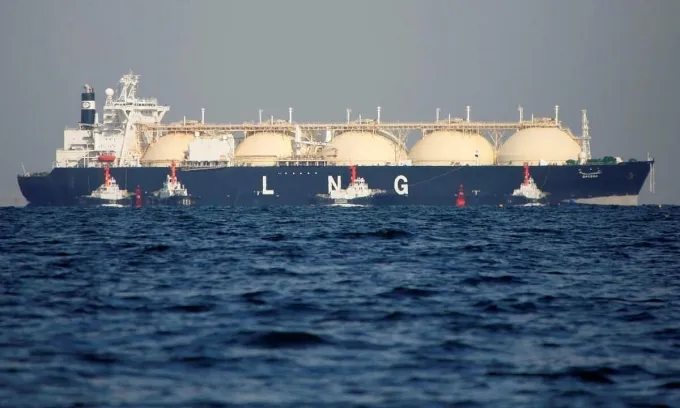
Associate Professor, Ph.D. NGÔ TRÍ LONG, an economic expert, emphasizes the necessity of developing robust policies to encourage investments in domestic LNG gas power projects and to establish a suitable price mechanism for Vietnam's LNG market in electricity production.
Importance of a LNG Gas Price Mechanism
The input LNG fuel price constitutes a significant portion, ranging from 70-80%, of the overall electricity price. This underscores the critical need for a well-defined and transparent pricing mechanism for LNG in the Vietnamese market. Dr. Ngô Trí Long proposes the creation of specialized focal centers responsible for LNG importation, ensuring state management and supervision to guarantee openness, transparency, and rigor in the country's LNG market.
The promotion of LNG consumption for electricity production faces hurdles due to the absence of a clear LNG price policy mechanism. The delay in approving LNG gas purchase contracts and uncertainties surrounding LNG import costs, including transportation and storage, impedes progress. Dr. Ngô Trí Long calls for the prompt issuance of a power generation price framework for LNG projects, allowing them to transfer gas prices to electricity prices.
LNG prices in Vietnam are influenced by two main factors. Firstly, the price of imported LNG from the world market, considering factors such as source geography, supplier, negotiation methods, and import terms. Secondly, competitive fuel prices, such as fuel oil, diesel oil, liquefied petroleum gas (LPG), gasoline, electricity, biomass, and biofuel. These factors collectively impact the pricing of LNG supplied to power plants and consumers.
To address the complexities of LNG pricing, Dr. Ngô Trí Long advocates for specific instructions on determining electricity generation prices from LNG sources. This includes considerations for fuel prices, transportation costs, bidding methods, and electricity generation mechanisms within the national power system. The aim is to ensure flexibility in LNG pricing over the short and long term while maintaining a stable supply for the power industry.
As Vietnam navigates its energy transition, establishing a comprehensive and transparent pricing mechanism for LNG in electricity production is essential. Dr. Ngô Trí Long's insights emphasize the urgency of policy development to encourage investments in LNG gas power projects and facilitate the seamless integration of LNG into Vietnam's evolving energy landscape.
Urgent Need for Support Mechanisms
As Vietnam focuses on LNG power projects to meet its growing energy demand, it is essential to establish specific mechanisms that encourage businesses to invest in these ventures. With 13 LNG power projects approved by the Prime Minister, the country aims to have 22,400 MW of LNG gas power, constituting 14.9% of the total power source by 2030. However, the lengthy timeline for planning and implementing such projects poses challenges, and a robust support system is required to ensure energy security and grid stability.
Given the extended timeframe for LNG power projects and their crucial role in energy security, the government must implement specific mechanisms and policies to support businesses. This includes tax incentives, loan support, and clear regulations on the approval and construction processes. The establishment of grant programs, investment funds, or low-interest loan support mechanisms can alleviate the initial financial burden on businesses and expedite the capital recovery process for LNG gas power projects.
To enhance overall efficiency and maintain a balance between imported and domestically exploited gas, specific mechanisms are required to encourage the exploitation of domestic gas sources. This involves focusing on associated gas sources and small to marginal fields. A comprehensive approach, from upstream to consumers, should guide these efforts, fostering a harmonious balance between imported and domestic gas output.
LNG prices are subject to significant fluctuations, impacting project viability. To address this challenge, the government and competent authorities must develop an appropriate mechanism for LNG gas prices sold to electricity consumers. Establishing price stability is fundamental to ensuring project efficiency and attracting investment in LNG gas power projects.
To prevent delays and ensure project implementation, there should be a mechanism for selecting investors with sufficient capacity and experience. In the absence of government guarantees and electricity consumption agreements, gas-fired power generation enterprises may face difficulties in executing projects on schedule and effectively. Addressing this issue is crucial for the successful implementation of all LNG projects.
The urgency of developing specific mechanisms to encourage businesses to invest in LNG power projects is evident. By providing essential support through tax incentives, loan mechanisms, and clear regulatory frameworks, Vietnam can expedite the deployment of LNG projects, contributing to energy security and a stable power grid. Additionally, fostering a balanced approach between imported and domestic gas sources and stabilizing LNG prices will further strengthen the foundation for successful LNG gas power projects in the country.




















